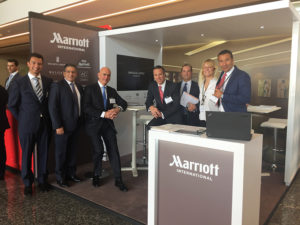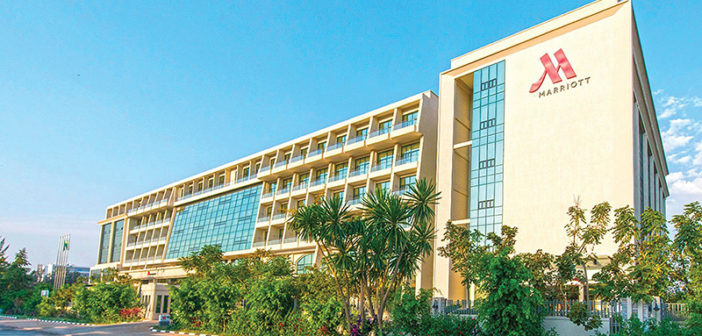KIGALI, RWANDA—The opening last month of the first Marriott hotel here in this country’s capital city signals the global lodging giant’s continued drive to make significant inroads into Africa.
The sub-Saharan foray marks not only a milestone in Marriott International’s almost 90-year history, but is considered by some observers as an economic watershed for the area.
Privately owned by Hatari Sekoko and Billy Cheung, the 254-room hotel, which will look to capture a portion of the city’s burgeoning meetings and events business, has opened some 500 jobs to the area. It has partnered with local and international entities to train area residents to help staff the hotel across a number of positions, including supervisory.
According to Marriott President/CEO Arne Sorenson, “The vision behind entering Rwanda is twofold. One is the growing tourism market in the region and the other is opportunity to partner with the local community in Kigali to build something that benefits everyone.
“Rwanda is going through an economic transformation and we are proud to be a part of it.”
Marriott partnered with local organizations to help staff the hotel and incorporate locally produced goods. For example, the hotel teamed with the Akilah Institute for Women to recruit and train Rwandan women for supervisory positions at the Kigali Marriott. The Institute helps young women from the region achieve economic independence via education and training and Marriott has invited more than three dozen graduates to work and train at its hotels in Africa and the Middle East.
The chain also worked with Women for Women International and the Relationship Coffee Institute, both of which are supported by Bloomberg Philanthropies, one of the largest investors in the region. The local Women for Women Opportunity Center assists women in gaining skills needed to apply for entry-level hotel positions or to supply the hotel with goods such as cheese, honey and baskets. The Kigali Marriott already has hired more than 25 women from the training center.
Similarly, the Kigali Marriott’s Question Café serves locally sourced coffee grown at small farms and served by graduates of the Relationship Coffee Institute, an economic-development training program.
According to Patricia E. Harris, CEO of Bloomberg Philanthropies, “The opening of this Marriott hotel is providing long-anticipated market activity for Rwandan women. Their café in the hotel provides the global business community with a perfect example of how business, philanthropy and government can work together to improve people’s lives.”
The Kigali Marriott also is offering an array of local goods in its retail store and on its menus.
Alex Kyriakidis, Marriott’s president/managing director-Middle East and Africa, observed, “There is something about this project that is particularly fulfilling. Every time we open a hotel, we know there is an enormous positive impact on a community. But here in Rwanda, that impact is magnified by the sustainable approach we have taken to both staffing and supplying the hotel.”
In describing its interest now among travelers and how Marriott might be advancing positive perceptions of a once-conflicted country, Sorenson said, “Rwanda has made transformative progress in terms of its economy and infrastructure. Coupled with that transformation is mutual promise for opportunity—both for Marriott as a hospitality company and for the communities and partners who will help us succeed in this market.”
According to the World Travel & Tourism Council, Rwanda’s travel and tourism industry generated 7.1% of the country’s GDP in 2015 and predicted it to grow at 4.1% annually through 2025.

Marriott International executives recently gathered in Africa. Pictured, left to right, are: Jarrett Swersky; Samir Baidas; Alex Kyriakidis; Arne Sorenson; Tony Capuano; Jennifer Mauerhofer; and Karim Cheltout.
Marriott has been active in bringing its brands to Africa and, in 2014, acquired the continent-specific 116-hotel Protea Hospitality Group. The Protea portfolio represents close to 10,000 guestrooms in seven African countries, including South Africa, spread across diverse hotels and resorts, as well as its boutique Protea Hotel Fire & Ice! and African Pride Hotels collection.
Asked why the decision was made to go with a Marriott in Kigali rather than a Protea, Sorenson said, “Though Protea does have a strong presence in Africa, we wanted to bring our signature Marriott Hotels and Resorts brand to sub-Saharan Africa. As we move forward, we plan to bring the Residence Inn, AC Hotels and Sheraton brands in countries such as South Africa and Mauritius. Each one of our brands caters to a different kind of customer. By introducing these brands, we hope to offer a variety of guest experiences for Africa’s growing travel and tourism market.”
The day after the Kigali Marriott opened in early October, the mega-chain announced it had inked deals for a half-dozen new properties in Cairo, Mauritius, Nairobi and, notably, in Cape Town, where three new hotels will be developed by Amdec Group, a privately owned property development and investment firm considered South Africa’s leading developer of “New Urban” lifestyle residential and commercial projects.
Amdec will develop the 200-room Cape Town Marriott Hotel Foreshore and the 150-room Residence Inn by Marriott Cape Town Foreshore in Harbour Arch. The 189-room AC Hotel Cape Town Waterfront will be a first for the brand in Africa.
The developments are the latest from Amdec Group, which formed a partnership with Marriott last year to develop the first two Marriott-branded hotels in South Africa: the Johannesburg Marriott Hotel Melrose Arch and the Marriott Executive Apartments Johannesburg Melrose Arch, an upscale market in that city. The hotels are slated to open in 2018. Amdec’s total investment in the Cape Town and Johannesburg developments amounts to more than R3 billion [approximately $216.4 million]between the two cities, which is expected to help drive the local economy.
Three brands formerly under Starwood are being added to Marriott’s distribution. In Mauritius, the Sheraton brand will make its debut in 2020 with Sheraton Mauritius St. Felix Resort and The Residences at Sheraton Mauritius St. Felix Resort. Owned by Clear Ocean Hotel Resorts Ltd., the property will be part of a mixed-use development.
Egypt will see its first Element hotel in 2019 in Cairo’s upscale Heliopolis district. The hotel, owned by Middle East Real Estate for Development, is coming out of the ground via Abraj Misr Urban Development, and will be part of The Gate Project, currently considered the largest administrative, commercial and housing project in Egypt and the Middle East.
In 2017, Owner Kamcan Properties Ltd. will open the 96-room Four Points by Sheraton Nairobi, Hurlingham, the brand’s second hotel in the city.
Like the Kigali Marriott, the six projects will have economic impact in their markets. During their construction, Marriott estimates roughly 8,000 construction-related jobs will be created, and once the hotels open, an aggregate 700 hospitality jobs will be created.
“These news deals are testament to our combined development efforts going forward, as there are significant growth synergies between the brands and our newly combined company, with a focus on expending brands across the region, and looking for opportunities in new markets,” noted Kyriakidis.
With its acquisition of Starwood Hotels & Resorts Worldwide completed, Marriott International more than doubled its distribution in the Middle East and Africa, and now is the largest hospitality company in Africa with more than 125 properties and 15,000-plus rooms. By 2025, Marriott plans to expand its presence in Africa to 27 countries, with more than 200 hotels representing approximately 37,000 rooms.
“Africa is important to our expansion strategy because of the continent’s rapid economic growth, expanding middle class, youth population and increase of international flights into the continent,” said Sorenson. HB


